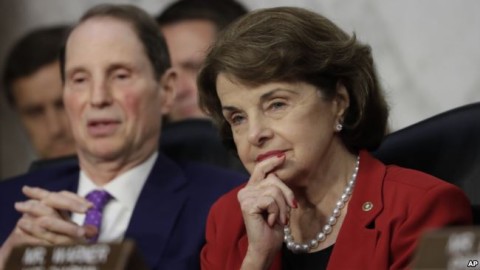A religious test from Dianne Feinstein?
The senator's questioning of a Catholic judicial nominee misrepresented the nature of faith—and overstepped the spirit, at least, of the Constitution.

Every day we bring the full texture of our lives to our different engagements. When playing tennis or dining with friends, for example, I don’t leave behind my various identities as father, husband, pastor, nonfiction junkie, and lover of fresh fruit smoothies and long bike rides, to name a few. They come with me. I don’t leave behind my Christian sensibilities either, though the most precious elements of my faith don’t seem to improve my tennis game or always align with my friends’ faith as it is shared around a dinner table.
It should not seem strange, therefore, that legislators and judicial appointees bring their personal faith lives into the public sphere. Would we want it otherwise? Expecting our public servants to ignore their personal beliefs would be as unwise as it is impossible, especially when those beliefs provide shape to their understanding of the world. Some of us may even long for more public officials to acquire religious convictions that are deep and particular enough to actually guide moral judgment and ethical decision making.
When California senator Dianne Feinstein questioned judicial nominee Amy Coney Barrett during a Judiciary Committee hearing last month, she zeroed in on the nominee’s Catholic faith as a potential obstacle to wise legal judgment. “The dogma lives loudly within you,” said Feinstein, before offering a mini-lecture on the difference between dogma and law. Whether or not the senator’s remarks were classic anti-Catholic bigotry, as critics quickly claimed, they certainly overstepped the spirit, if not the letter, of the Constitution’s ban on imposing a religious test for public office.
It would be one thing if Amy Barrett had ever issued rulings that would have given senators reason to suspect she might allow her religious beliefs to supersede an obligation to apply the Constitution. But her writings indicate nothing more than conventional piety at play and the clear opinion that judges ought to recuse themselves from cases where religious convictions might interfere with carrying out the law. If her judicial record bore any resemblance to someone like former Alabama chief justice Roy Moore, who has used his faith to blatantly disregard the law and display contempt for federal court orders, more aggressive questioning of Barrett might have been in order.
Disqualifying people from public office or judicial appointment simply for the faith they hold is hardly America. We are E pluribus unum—“out of many, one.” Our Constitution makes room for many varieties of religious belief.
University of Notre Dame president John Jenkins had a sharp retort for Feinstein’s line about dogma living loudly within the nominee. “[That] is a condition we call faith,” he said. And that condition, we might add, is of inestimable value when navigating difficult ethical questions in a complex world.
A version of this article appears in the October 11 print edition under the title “No religious test.”






